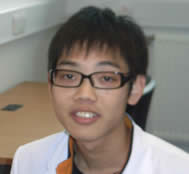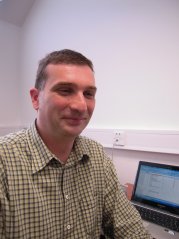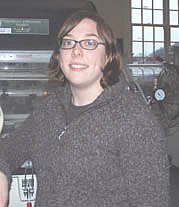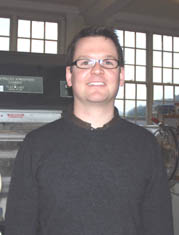Visitors
BART is happy to welcome visitors from overseas (or UK) academic and research institutions, to learn from (and with) us. Unfortunately, we are not able to offer financial assistance to visiting scientists, but are happy to lend whatever support we can to secure support from outside organizations. Here are some people who have worked with us at Bangor.
Hanna Virpiranta
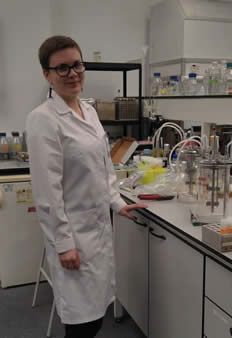
My name is Hanna Virpiranta and I am working as a doctoral researcher at the Chemical Process Engineering research group at University of Oulu in Finland. I started my PhD studies about a year ago and the main topic of my research is development of process for microbial sulfate reduction at cold temperatures. I stayed at BART for two weeks, from 12th until 25th February 2019. The purpose of my visit was to learn more about anaerobic bacterial cultivations and especially about operating anaerobic bioreactors. I was also practicing different plating techniques and isolation of sulfate reducing bacteria.
Working at BART was a great experience and I would like to thank Prof. Barrie Johnson for the opportunity to visit his research group. I am also really grateful to other BART team members for all their help and support. I learned a lot from Dr. Sarah Smith and Dr. Barry Grail and had also great time with the other visitors Elis and Alidi. Hope to see you all again soon!Ali-Budhi Kusuma (Alidi)
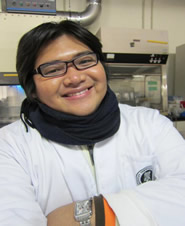
My name is Ali-Budhi Kusuma (Alidi), I am a 2nd year microbiology PhD student in the School of Natural and Environmental Sciences (SNES), Newcastle University, under the supervision of Prof. Hans-Peter Klenk and Dr. JEM Stach. The main topic of my research is antimicrobial bioprospecting from Indonesian extremophilic actinobacteria, including extreme acidophiles. I stayed at BART for a week from 29th January until 2nd February 2018 with the main purpose to learn overlay plate techniques to cultivate extremely acidophilic prokaryotes below pH 3.0. On top of that, I also learned other important things such as preservation technique for acidophilic microorganisms, DNA extraction from acidophiles, etc.
I would like to specially thank Prof Barrie Johnson for giving me this short internship opportunity, it was a really great experience for me and surely it will contribute to my future career. My special thanks also to Barry Grail who took care of me on daily basis in the lab and gave me many useful lab hints. Last but not least, I was also grateful to be surrounded by very amazing BART team members (Anna, Rose, Sarah, and Carmen) who accepted me like a family and made me feels at home in BART.
Yusei Masaki
I am currently a PhD student at the department of Earth Resources Engineering, University of Kyushu, in Japan. I had studied environmental remediation approaches using microorganisms during my master course. I stayed at University of Bangor from 30.8.14 to 5.9.14 through an internship program supported by Advanced Graduate Program in Global Strategy for Green Asia. The main purpose of this internship was to gain experience of experimental techniques and study mechanisms of bioleaching. Of course, training of my English skill was also one of the aims. Bangor and the surrounding towns such as Caernarvon, Conwy and Llanberis are nice place for sightseeing, so I could really enjoy my stay in Wales. I really thank all of lab members for their help and kindness, especially Prof. Barrie Johnson. This 2-month stay was a good experience for me, and it will surely contribute to my future researches.
Harold Nuñez Burgos, Ph.D
I am a postdoctoral fellow in the lab of Microbial Ecophysiology lead by Dr. Raquel Quatrini at Fundación Ciencia y Vida, Chile. We utilize a combination of bioinformatics, comparative genomic strategies and molecular biology to elucidate and improve the knowledge, dynamics and interactions between bioleaching microorganisms. My research focuses on the microbial population structure from bioleaching and AMD environments. I work using bioinformatics, genetic markers and high resolution typification strategies (MLST, Next Generation Sequencing) to achieve my goals. I came to Bangor thanks to a collaboration between Professors Barrie Johnson and Raquel Quatrini supported by the National Sciences and Technologies Committee (Conicyt, Chile). My visit during the spring of 2014 allowed me to support our phylogenetics findings and improve my knowledge of the physiology of extremophile microorganisms. Working at BART laboratory had been a great and stimulating experience.
Jonathan Chan
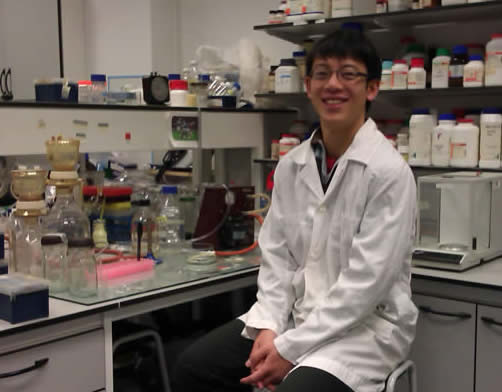
Jonathan came to BART during his half term holidays to carry out his work experience placement.
Srdjan Stankovic
I am PhD student at Faculty of Mining and Geology, University of Belgrade, Serbia. I graduated at Faculty of Biology, Department of Molecular Biology and Physiology, University of Belgrade. Serbia has significant deposits of copper in eastern part of country, mostly around town of Bor. Copper mine in Bor is in operation since 1904. During that time, as a result of mining activities, billions of tonnes of tailings and waste rock have been deposited around town of Bor. It had devastating effect on environment – pollution of soil, water and air. Sulfidic minerals exposed to air and water generated acid mine drainage. That water is collecting for decades in pits, and that process led to formation of highly acidic ponds and lakes. I’m investigating microbial diversity of acidic lakes and tailings that surround them, and I’m testing ability of natural microbial consortia to leach metals from tailings. This approach could have economical and environmental benefits.
I’m very grateful to Professor Barrie Johnson who invited me to visit his laboratory as guest research scientist. During my visit I significantly improved my skills and learned crucial methods for my further research.
I also want to say thanks to Dr Ivan Nancucheo, who was “taking care of me” in the lab, for his help and patience.
Graciana Willis
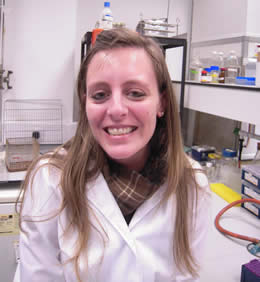
I am currently doing the second year of my PhD in the Center of Research and Development in Industrial Fermentations (CINDEFI) at the University of La Plata, Argentina. The main topic of my research is the bioremediation of heavy metals in waste waters by sulfate-reducing microorganisms from the geothermal area of Caviahue-Copahue (Neuquen, Argentina). I came to BART to do my first step of my research, which involves the isolation and characterization of these microorganisms by culturing and molecular techniques.
I want specially thank Prof Barrie Johnson and the whole team at BART for gave me the opportunity to spend this three months working in this research group. I am learning many things and I am sure they will be very useful for all at the laboratory in Argentina. The whole group has been very kind and helpful with me, and they are always there to help me in everything I ask. So I am really happy to work here for this short period of time.
Pinar Aytar
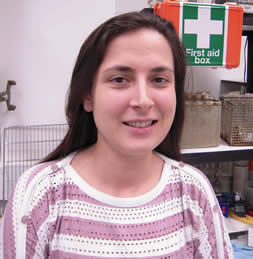
I am currently a PhD student at the Division of Biology, Eskisehir Osmangazi University in Turkey. I focused both several bioprocess including biodesulphurization, biodegradation, biosorption, biobased production etc. and microbial diversity researches at extreme conditions such as acidophile micoorganisms. Among these topics, especially, I am interested in biodesulphurization in recent years. I gained a fellowship from The Scientific and Technological Research Council of Turkey. My PhD Thesis is determining prokaryotic diversity in some acidic mine drainage, isolating acidophiles from these and investigating their biotechnological applications such as biodesulphurization.
Barrie Johnson helped me by writing technical experience until now via e-mail and made an invitation for me to work as a visitor researcher in his group at Bangor University. I am really grateful to him for this opportunity. I gain working experiences which are not easily attainable in my home country. I am able to implement my previous knowledge and have high quality research experience in the field of biomining even after I return to my home country. Furthermore, I am learning many things thanks to the help in particular of Dr. Cath Kay. Thanks to all for very kind
Carmen Falagan
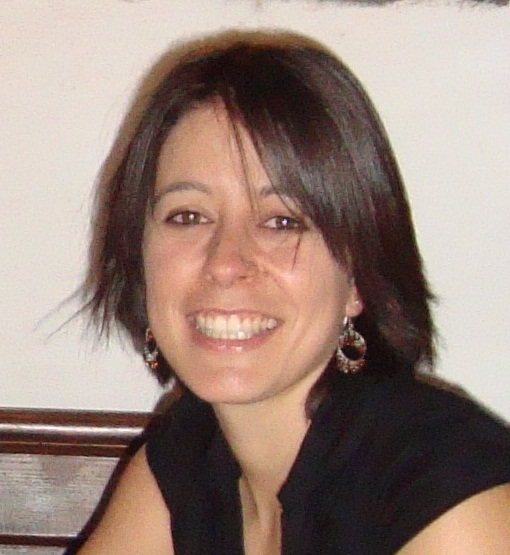
I am a visiting PhD research student based in the Geological Survey of Spain (IGME) in Madrid. I am studying the microbiology of two acidic mine pit lakes located in the Iberian Pyrite Belt (IPB). My research is part of a project funded by the Spanish Government called “Biotic and abiotic controls of chemical underwater stratification of acidic mine pit lakes”, whose principal researcher is Dr. Javier Sánchez-España. The aim of this project is to understand the hydrogeochemistry of these pit lakes and how that is controlled by the biological activity in the water column and sediments. Previously, only the hydrogeochemistry of these lakes has been studied. Because of my biological background, I have been given the task of studying the microbiology of the lakes, and the Spanish Government awarded me a grant to stay in Bangor for 6 months to apply molecular and cultivation-based techniques to study these ecosystems. That’s why I am here!
I want to thank Prof. Barrie Johnson to allow me to come here to do part of my research. The team is brilliant, all of them have a huge knowledge and they are helping me a lot, so I am progressing and learning many useful things in my research. Thanks to all for your patient and kindness.
Gemma Bowsher
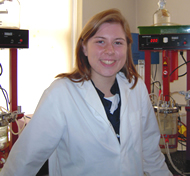
I am currently an A level student at St Paul’s Girls’
The project I am working on involves using acidophilic bacteria to reduce ferric iron to ferrous iron and I am really enjoying working on a single project in such great depth. Having been taught many new scientific methods, I now feel much more competent working in a lab and carrying out experiments independently. I am extremely grateful to Barrie Johnson and the whole team at BART for all their kind help and patience. I have learnt so much in such a short space of time and I could not have done so without their support.
Laura Rocchetti

I am currently attending the second year of a PhD in the Department of Marine Sciences at the Polytechnic University of Marche, Italy. The main topic of my research is bioremediation applied on contaminated sediments. At the Bangor University I am involved in a research project that investigates microbial communities present in acid mine drainage using molecular biology techniques.
I really want to thank Prof. Barrie Johnson for the opportunity to spend some months working in his research group. BART is a highly qualified team, where all the activities that I am doing are very interesting. I am learning many things thanks to the experience of Dr. Kevin Hallberg, very helpful researcher and always available for constructive exchanges of ideas. I am sure that the knowledge acquired will be useful when I will come back to my laboratory. All the colleagues in the laboratory are friendly and kind. I cannot find anything wrong about this experience. So I am really happy to work here, even if for a short while.
Uli Klümper
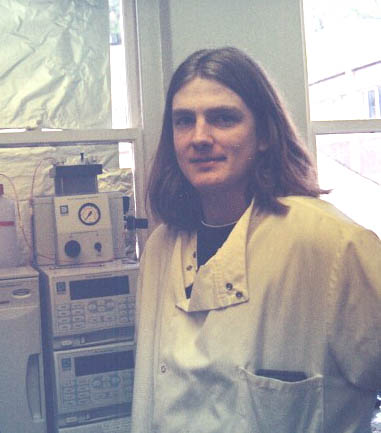
I came to Bangor to explore my first own research attempts. After 2.5 years of studying “Water Science” at the University Duisburg-Essen in Germany, I got the opportunity to go abroad for 4 months and to complete my degree by writing my bachelor thesis there. The BART was my choice, because their fields of research are very interesting and combine my main disciplines of chemistry, microbiology and analytical chemistry perfectly, so that I am able to use my acquired knowledge for the first time and make some great experiences in their practical approaches, while being part of BART.
I will stay in Bangor for a period of 16 weeks from April to August 2009, working there on an online bioremediation system for acid mine drainage using acidophilic bacteria. After three weeks in Wales I am very pleased with my choice and the must thank the Team for this opportunity.
Brenda Bailey
I am a Ph.D. candidate at the University of Waterloo (UW), Ontario, Canada and visited BART to explore various molecular techniques that could be applied to my research. My research interests incorporate the effects of industry on the environment and various preventative measures to avoid large scale contamination. More specifically, I am studying the geochemical and microbiological processes that occur within waste rock piles at the Diavik Diamond mine in northern Canada. In February 2008, I had the pleasure of visiting Bangor on a collaborative research effort sponsored by Rio Tinto between Professors Barrie Johnson and Dave Blowes (UW).
Matt Lindsay
My Ph.D. research at the University of Waterloo (UW), in Waterloo, Ontario, Canada, focuses on passive in-situ tailings pore-water remediation. This method of treatment is based on the same principles as permeable reactive barriers (PRBs) designed to treat acid mine drainage (AMD) by stimulating sulfate reduction. The use of molecular techniques to complement geochemical and mineralogical data is valuable to data interpretation and performance optimization. A collaborative research initiative between Professors Barrie Johnson and David Blowes (UW) was arranged by Rio Tinto, and resulted in an opportunity for me to visit the BART laboratory in February, 2008. My short time in Bangor was very insightful and working with the BART group was a great experience.
Javed Iqbal Qazi
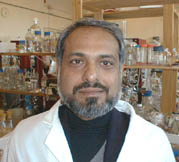
I am professor of zoology at the University of the Punjab, Lahore Pakistan. I have been teaching and supervising research in environmental microbiology for the last fifteen years. Having been offered a fellowship by the Government of Pakistan, I have recently joined the School of Biological Sciences at Bangor University. I am working with the team led by Professor Barrie Johnson with the aim of learning modern biomolecular techniques for application in environmental biotechnology. I have found in BART a very pleasant working environment - the whole team works like an established well coordinated family.
Tadayoshi Kanao
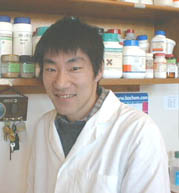
I came to Bangor from Okayama in the middle west side of the main island (Honshu) of Japan, in June 2007. I am studying acidophilic bacteria (and English) in BART looking at bacterial iron oxidation and the properties of biomining bacteria in the laboratory. How am I studying English? I go to Pub with laboratory members every Friday evening. It is good opportunity for listening and talking English with a pint of Guinness! They have a lot of fun.Bangor is really nice place except rains and gales (both of them come together frequently. It is horrible!). My accommodation is near “Menai Bridge” on the isle of Anglesey and I use a bus to go to the laboratory every day, which gives me the sight of Menai straits from the bridge to Anglesey. I enjoy seeing this whenever weather is nice. I am grateful to Prof. Barrie Johnson and all members of BART for their kindness and friendship. The time spent in Bangor will be a great experience for my life.
Djamila Slyemi
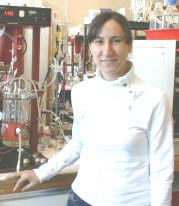
Hello! I come from Marseille (FRANCE). I am doing a "doctorat" in Microbiology and Biotechnologies in the "Laboratoire de Chimie Bacterienne" (LCB), CNRS (Centre pour la Recherche Scientifique) in Violaine Bonnefoy's group in Marseille since November 2006.
I came to the School of Biological Sciences in Bangor in order to work with BART. The members of this group were very sympathetic and nice, and I enjoyed working with them. I discovered ion chromatography, which I had never used before!
My stay was short ( only 2 weeks!) but during this time I was able to discover Welsh life and I keep many beautiful memories of my visit in the Welsh country!! I want to thank Barrie Johnson for his assistance for my experiments and also Stewart. I don't forget Kathryn, Kevin, Pedro, Rich and Owen and I thank them for their kindness.
Yajie Liu - "Alexandra"
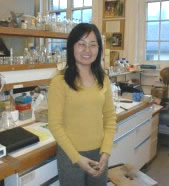
I am an associate professor of East China Institute of Technology and joined BART in 2006 as a visiting research scholar in order to study molecular techniques in the fields of bioleaching. My visit was supported by the Chinese Scholarship Council, and lasted for 8 months.
During my study, I mainly focused on the application of a ‘top own’ approach to optimizing microbial consortia for leaching different mineral concentrates, as part of the BioMinE project. That involved biomolecular methods and analytical techniques, as well as microbiology, all of which will benefit to my further research activities in China. All of experiments have excited my great interesting in this area and will improve my research after I go back.
*Yajie Liu (who was known to most of us as Alexandra) returned to China in New Years Eve, 2006 and maintains regular contact with BART. It is hoped the more formal links can be made between Bangor University and the East China Institute of Technology following Ms. Liu’s successful stay in Bangor and a reciprocal visit of Barrie Johnson to China, in November 2006.
Caitlin Smits
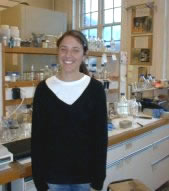
Caitlin completed her third year of an honours degree in chemical engineering at the University of Cape Town in South Africa in late 2006 and joined BART for 8 weeks (of her vacation!) to obtain training and experience in a range of microbial and analytical techniques. She also completed a project concerned with bioleaching of metal concentrates at “ultra-low” low pH, by mixed cultures of acidophiles, as part of BioMinE. She returned to South Africa at the end of January 2007 to commence her final year of her undergraduate degree at UCT.
Hannele Auvinen
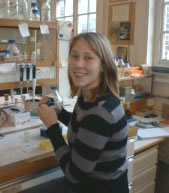
I came to Bangor from Tampere, the second biggest city in Finland. I’ve studied environmental biotechnology for 3 years and I hope to graduate in 2 years. My wish is to get a job involving remediation. I first heard about BART-team when I went to talk to my professor Jaakko Puhakka about spending a couple of months abroad learning new lab skills. And suddenly here I was doing a project on bioleaching! About Wales I like the scenery, especially the mountains, which we don’t have in Finland at all. I had the best time in this university, probably the best three months in school ever!
Milagros Quintana
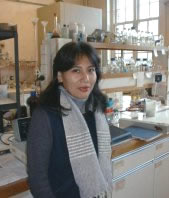
I have always been especially interested for environment and the microorganisms living in extreme habitats. I came to Bangor from Lima, Peru, to learn strategies for bioremediating metal-polluted environments, and techniques developed at BART for identifying and studying microbial communities in passive mine water treatment systems. My training is part of a project promoted by the IAEA (International Atomic Energy Agency) for bioremediation of abandoned mines in Huancavelica, Peru (largely mining country) through the Peruvian Institute of Nuclear Energy (IPEN), the place where the project will be developed and where I have been working one year ago.
I am very grateful for this period in the laboratory where I have had the opportunity of increasing and enriching my knowledge in the fascinating field of biomining.
Vic Absolon
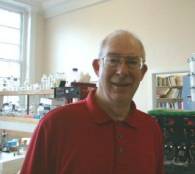
Vic Absolon, a PhD student from the Ian Wark Research Institute, University of South Australia commenced a 5 week stay (4 July to 10 August 2002) working with Dr. Barrie Johnson and the Bangor Acidophile Research Team at the University of Wales. Vic is working on collaborative research, sponsored by Rio Tinto, on the application of acidophiles to sulfide leaching.
Nouhou Diaby
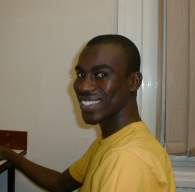
Nouhou Diaby has visited us twice recently, the last time being in February 2003, to learn the techniques we use to study acidophiles. Originally from Senegal, he is studying for a Ph.D. in environmental studies at the University of Geneva in Switzerland. As part of his studies, Nouhou is investigating the biogeochemistry of mine tailings dams under the supervision of Dr Bernhard Dold of the University of Lausanne, Switzerland.
